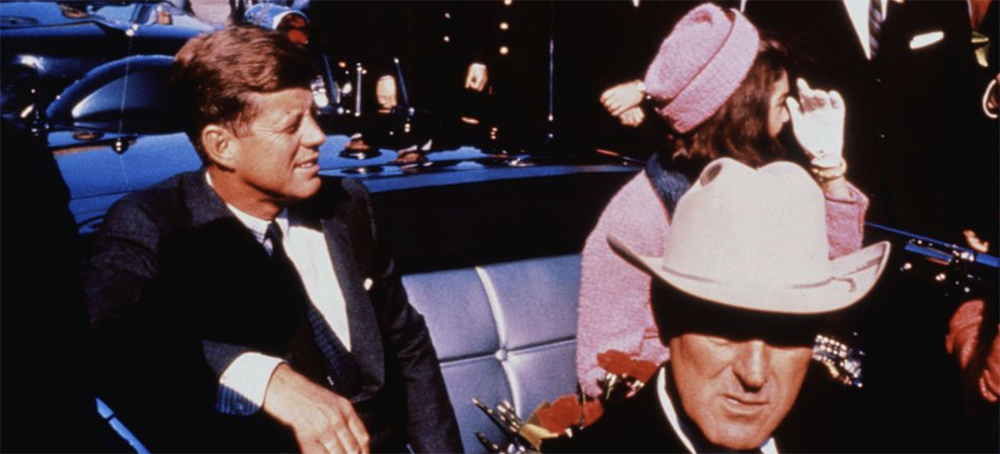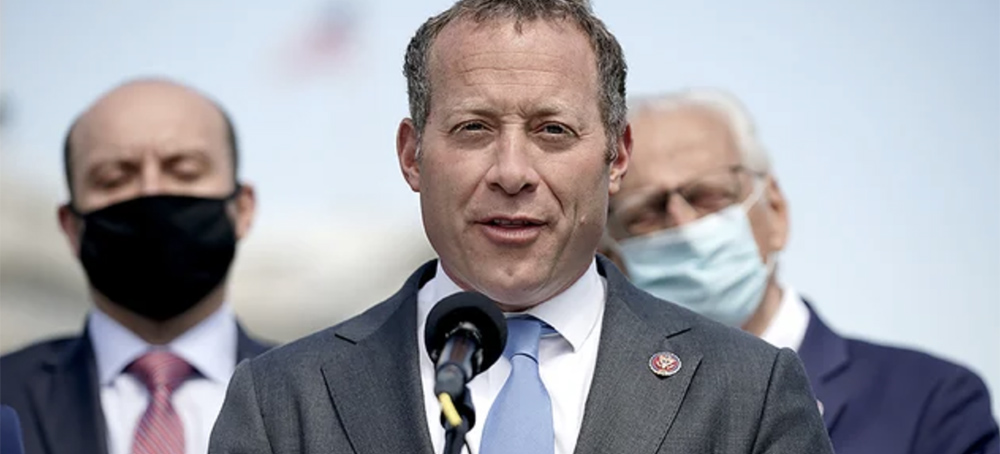Live on the homepage now!
Reader Supported News
It was 58 goddamn years back.
The other consistent phenomenon in the long aftermath of this crime is that, given a chance to dispel some of the suspicion and doubt attending the assassination, the United States government will dance enthusiastically on its own dick. The more conspiratorially minded of our fellow citizens conclude from this that the government is clumsily trying to dodge its own complicity. This has remained true even as the fight to release government records has ground out significant victories over the past two decades. Nevertheless, every bungle from every administration, Republican or Democratic, only deepens the suspicions. And now, the Biden Administration has joined its predecessors in adding to all that. From the New York Times:
The White House statement, signed by President Biden, did not make clear exactly how the coronavirus had delayed the release of the records, which must be released to comply with a 1992 congressional act, but said that the national archivist reported that the pandemic had a “significant impact on the agencies” that need to be consulted on redactions…The White House statement said that the National Archives required additional time to conduct research and work with the agencies, which include the Defense, Justice and State departments.
OK, so the pandemic is an all-purpose alibi for everything, but the official White House statement has a passage containing a dog that hasn’t hunted at least since the House Select Committee on Assassinations wrapped things up in 1978.
In the White House statement on Friday, President Biden said he agreed with the archivist’s recommendation that records be withheld from public disclosure until December 2022. “Temporary continued postponement,” he said, “is necessary to protect against identifiable harm to the military defense, intelligence operations, law enforcement, or the conduct of foreign relations that is of such gravity that it outweighs the public interest in immediate disclosure.”
It was 58 goddamn years ago. Most of the principals, known and unknown, are likely really, most sincerely, dead. Many of the countries with which we had “foreign relations” in 1963, and many of the countries against which we were defending ourselves, don’t even exist anymore. I suspect the vole in the turnips here lies somewhere between “intelligence operations” and “law enforcement.” Still, anyone who might be made uncomfortable even in that regard likely has gone off to the great stakeout in the sky.
My guess? The “intelligence community” is still covering up what it covered up in 1963. That would include what they knew about Oswald prior to the assassination and, probably, a helluva lot more about what was going on with the plot against Castro. Were there any documentary evidence concerning American involvement with the crime itself, I’m assuming that went into the shredder—or up James Jesus Angleton’s chimney—decades ago. But the Biden administration’s pale excuse for delaying the release of the records has been so thinned through the years that you can see right through it.
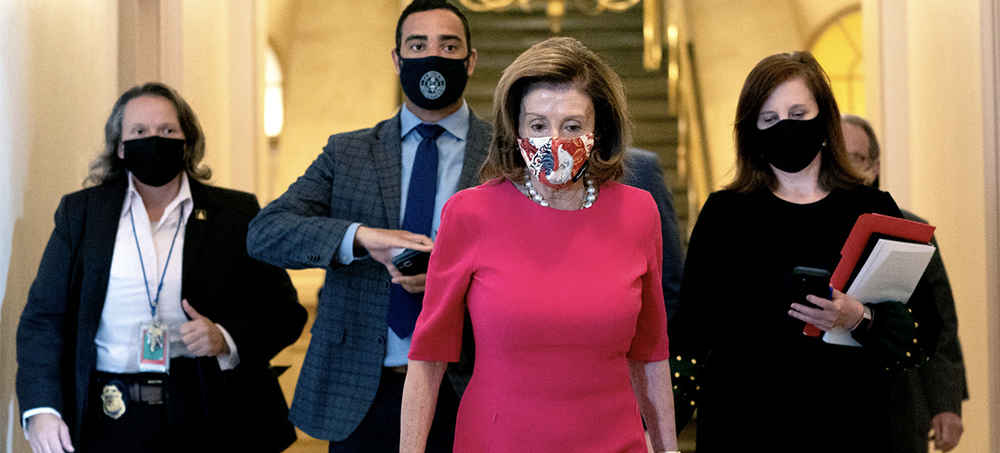 Speaker Nancy Pelosi initially said the House would not take up the infrastructure plan until after the broader bill had passed, but in recent days she has effectively decoupled the bills. (photo: Stefani Reynolds/NYT)
Speaker Nancy Pelosi initially said the House would not take up the infrastructure plan until after the broader bill had passed, but in recent days she has effectively decoupled the bills. (photo: Stefani Reynolds/NYT)
Top Democrats insist that a framework deal on Biden's social safety net package should be enough for members to vote for a separate $1.2 trillion bipartisan infrastructure package, but progressives say that is not sufficient to secure their support for the infrastructure bill.
Pelosi and Congressional Progressive Caucus Chair Pramila Jayapal emerged from a meeting on Tuesday at odds. Asked by CNN to respond to comments from Jayapal that a framework would not be adequate to vote for the infrastructure bill, Pelosi said defiantly, "I think it is."
Leading up to the meeting, top congressional Democrats had been forecasting that a deal on the larger package would be enough to get progressives on board with a vote on the bipartisan measure this week before key highway funding runs out on October 31.
But Jayapal squashed those hopes Tuesday afternoon. "There are some people who just want us to vote (the infrastructure bill) out on a framework," the Washington state Democrat said. "And I explained why our members don't want to do that."
The differing opinions between Pelosi and Jayapal over the kind of security a framework on the larger spending bill provides raise questions over whether Democrats can realistically bring the infrastructure bill to the floor this week. If Pelosi moves forward on the infrastructure bill with just a framework on the larger spending package -- which is a long way away from bill text and a floor vote -- she would be taking a gamble that progressives will abandon their long-held position that they want both bills to move together.
"It's not enough for me," progressive Rep. Cori Bush of Missouri tweeted Tuesday, responding to Pelosi's comments that a framework on the social safety net package was enough to move forward. "And there are more of us."
Earlier in the day, Pelosi had said she believed an agreement stating that the House and Senate would have to pass the same social safety net bill, with the Senate not being allowed to add any amendments, would unlock the standstill Democrats are in.
"Without an agreement, we don't even have a discussion," Pelosi said ahead of the meeting.
Progressive Rep. Mark Pocan of Wisconsin suggested that Biden could provide progressives with the assurances they need, even though his preference would still be to have a vote in both chambers.
"If the President tells us the votes are there," Pocan said, with the promise of no last-minute votes added in the Senate to change the contents of the bill, "I trust the President, and that would probably match the assurances that we've asked for."
The meeting between Jayapal and Pelosi was one of several high-profile Democratic meetings on Tuesday, a sign that negotiators are quickly searching for an agreement with time running out.
Leaders from five critical House Democratic caucuses traveled to the White House to meet with senior staff on Biden's climate and economic package, according to multiple people familiar with the matter.
Senate Democratic leaders hope to get a deal on a framework by the end of the day Wednesday, senators told CNN Tuesday afternoon.
Progressives push for Medicare expansion, drug price negotiation and paid leave
Aside from the process and vote sequencing issues, progressives are warning that their priorities must not be left behind as Democratic leaders race to finalize a deal on the social safety net plan and push for a House vote on infrastructure.
Moderate Democrats, such as Sens. Joe Manchin of West Virginia and Kyrsten Sinema of Arizona, have been influential in scaling back the overall size and ambition of what will be included in the larger package, much to the dismay of progressives. But if progressives withhold their votes for the bipartisan infrastructure bill, the House will not be able to pass it -- a scenario that played out once before at the end of September.
"I'm pissed off, man," progressive Rep. Jamaal Bowman of New York told CNN, about how Manchin has had an outsized role in scaling back the social safety net bill. "It's just unacceptable to me that one person from one state can have all this power."
While Pelosi told reporters after a closed door meeting Tuesday morning with Democrats that the social safety net bill is 90% written, major sticking points remain unresolved, including how much it will cost and how to pay for it.
Policy issues ranging from paid family leave provisions to an expansion of Medicare and prescription drug price negotiation have also become flashpoints that have divided progressives and moderates with no clear resolution.
The social safety net package aims to address key Democratic agenda items from health care to climate change to aid for families, but she said all outstanding decisions have to largely be made by the end of the day.
"There's not much more time," Pelosi said. "We have to have decisions largely today. A little bit into tomorrow. So, we can proceed."
Progressive Rep. Alexandria Ocasio-Cortez told reporters Tuesday that how the massive social spending bill handles both climate and health care will be "determinative."
"I think there are some areas where we feel good about," the New York Democrat said. "For me, the major outstanding pieces are on climate, and on health care, particularly Medicare and prescription drug prices. That's really where I think a lot of us are waiting to hear back on. And it's going to be quite determinative."
Vermont Independent Sen. Bernie Sanders said on Tuesday that the bill must include "real" authority for Medicare to negotiate drug prices -- something that has caused major issues with moderates, and that the bill must expand Medicare to include dental, hearing, vision coverage, another sticking point with moderates.
"Any serious reconciliation bill must include real Medicare negotiation to the pharmaceutical industry to lower the cost of prescription drugs. ... Any serious reconciliation bill must include expanding Medicare to cover dental, hearing aids and eyeglasses," Sanders said.
He would not respond when asked by CNN if it was a red line.
Democrats are aiming to pass the social safety net package through a process known as budget reconciliation, which would allow them to pass it in the Senate without any GOP votes. That maneuver, however, means that Democrats cannot afford to lose any Democratic votes in the Senate.
Democratic Rep. Rosa DeLauro of Connecticut, chairwoman of the House Appropriations Committee, said on Tuesday that she's not giving up on trying to get paid family leave into the bill, another thorny issue that has caused conflict within the party.
"I'm going to continue to push," DeLauro, a close ally of Pelosi, told reporters on Tuesday. "I take it a day at a time, my friends. It's not over until it's over."
DeLauro, a longtime advocate for both the child tax credit and paid family leave, said she hadn't heard much discussion about work requirements or means testing for the child tax credit.
Jayapal cautioned against drawing red lines on whether any particular provision being stripped out would change her opinion of the overall package, and said lawmakers need to wait for the package to be done.
"We just have to look at the whole thing. But obviously, some of the big priorities that we've had are all still on the table."
As much as progressives are fighting to get more of their priorities included in the package, many feel that without their pushing in the first place to keep the infrastructure bill linked to the social safety net bill, none of this extra spending would happen.
"I'll just remind everyone we would have had an infrastructure bill one week and probably have none of this had it not been for a few of us being willing to vote against the infrastructure bill," Pocan said. "And within a week, we've gone from $0 to $1.5 to $2 trillion in the second bill. So you know, we're going to look at it in that context."
Details on billionaire's tax expected Tuesday night
On top of there being uncertainty about whether certain programs are going to make it into the final package, there are still questions over how Democrats solidify how they pay for it.
Sinema opposed increasing the corporate tax rate and the top marginal rate on individuals, which sent Democrats back to the drawing board. In the race to find alternative ways to pay for their massive social spending and climate change package, Democrats are now targeting the wealth of the richest Americans. The problem is most still have not seen the details of the billionaire tax that is being floated.
Pelosi told members in the closed door meeting Tuesday morning that Democrats are still waiting for the language around the proposed billionaire tax from the Senate, according to a source in the room.
House Majority Leader Steny Hoyer told reporters that he still had not seen the language of the billionaire tax.
"I haven't seen it on paper. As a matter of fact, it's not on paper yet," Hoyer said.
Senate Finance Committee Chairman Ron Wyden told reporters later in the afternoon that there will be details and paper released Tuesday night on the billionaire's tax proposal.
White House senior officials Steve Ricchetti and Brian Deese met with Sinema on Capitol Hill earlier Tuesday, according to a source familiar.
Separately, Sinema is in talks with Senate Democrats, including Wyden, on both the billionaires' tax and a corporate minimum tax, respectively, and is close to agreement on both issues
Prominent moderate says 'we still have work to do'
At the same time, moderate Democrats are also working to assert leverage over the process.
Democratic Rep. Henry Cuellar of Texas, who has been part of the moderate group of members pushing for the bipartisan infrastructure bill to get a standalone vote, told reporters after the Democratic caucus meeting that it's time for members to start selling what's in the social safety net bill, and not focus on what might not make it into the final version.
"There's a lot of good things. Don't look at things that were not included," Cuellar said. "We've got to start selling and there's so much to sell."
Cuellar said Pelosi made her pitch to members in the room, including progressives, that the goal is to focus on the end result of the process.
"I think she was teaching Government 101. Just telling the members, 'Hey, this is the way the process works. It's not what you want. It's what you can get out of the process.' She did an excellent job," Cuellar said.
Cuellar said he was sitting next to a progressive in the meeting who was unsure about voting for the infrastructure bill because of where things stood with the social safety net package and Cuellar relayed to reporters that he told that member, "'Hey, listen, we all went through that. We all go through that, but that's legislation. I mean, that's what you do when you legislate. You look at things and you compromise, not only among ourselves, but with the Senate also."
Leaving a meeting in Pelosi's office on Tuesday, Democratic Rep. Josh Gottheimer of New Jersey, co-chair of the bipartisan Problem Solvers Caucus, said, "We still have work to do" on the social safety net proposal. The meeting was held with members from New Jersey and Virginia -- two states holding elections next week -- to stress the importance of passing the infrastructure bill as well as the larger social safety net package.
"We were talking about the areas where we need to keep moving the ball," Gottheimer said, though he declined to name them. "We're slowly getting there."
"We were all talking about the importance of getting this done now, and that we can't wait any longer," he said.
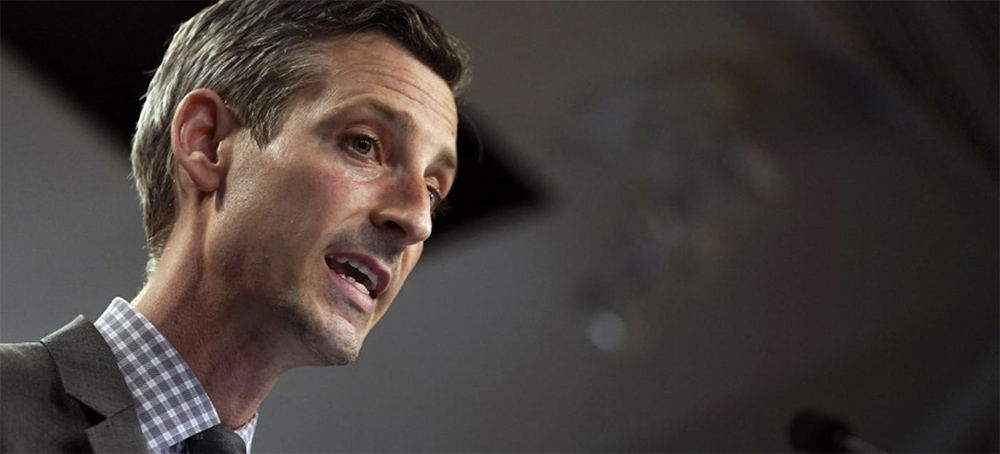 US State Department spokesman Ned Price speaks during a briefing on 31 March 31, 2021. (photo: AFP)
US State Department spokesman Ned Price speaks during a briefing on 31 March 31, 2021. (photo: AFP)
Spokesman Ned Price also said the U.S. was concerned about another 1300 tenders sought for West Bank settlements this past weekend.
“We strongly oppose the expansion of settlements, which is completely inconsistent with efforts to lower tensions and to ensure calm,” Price said, adding it “damages the prospects for a two state solution.”
Meanwhile, Israel is sending an envoy to Washington amid a deepening rift with the Biden administration over six outlawed Palestinian rights groups, a Foreign Ministry official said Tuesday.
Israel last week designated the prominent Palestinian human rights groups as terrorist organizations, sparking international criticism and repeated assertions by Israel’s top strategic partner, the United States, that there had been no advance warning of the move.
Israel’s decision marked what critics say was a major escalation of its decades-long crackdown on political activism in the occupied territories. The U.S. State Department has said it would seek more information on the decision.
Joshua Zarka, a senior Israeli Foreign Ministry official, told Israeli Army Radio the envoy would “give them all the details and to present them all the intelligence” during his visit in the coming days.
The rights groups decision is emerging as a test of the relationship between the Biden administration and Israel’s new government, which was formed in June by eight politically disparate parties. The coalition ended the 12-year rule of former Prime Minister Benjamin Netanyahu.
Marking the 50th anniversary of the U.N.’s Resolution on Chinese representation, Price reiterated that the U.S supports “Taiwan’s ability to participate meaningfully at the U.N. and to contribute its valuable expertise to address many of the global challenges we face.”
The State Department confirmed in a weekend statement that U.S. and Taiwanese officials had met virtually for a “discussion focused on supporting Taiwan’s ability to participate meaningfully at the UN.”
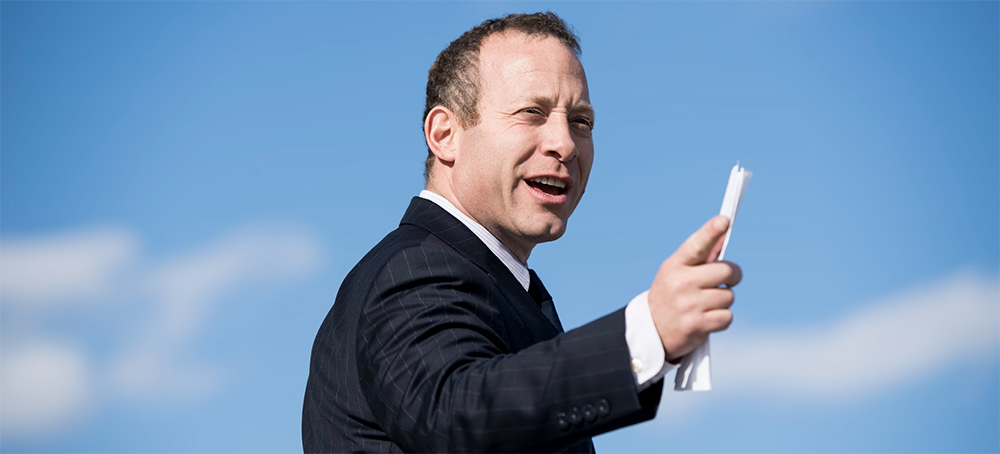 Josh Gottheimer. (photo: Bill Clark/CQ Roll Call/Getty Images)
Josh Gottheimer. (photo: Bill Clark/CQ Roll Call/Getty Images)
Wealthy donors rushed funds to conservative Democrats after they threatened to torpedo the Build Back Better plan.
On August 12, New Jersey Rep. Josh Gottheimer, the Democratic head of the bipartisan Problem Solvers Caucus, and eight colleagues sent House Speaker Nancy Pelosi a letter demanding she put a corporate-backed infrastructure plan on the House floor immediately. They wanted Pelosi to abandon the two-track strategy to tie the bipartisan infrastructure deal to the reconciliation deal. By doing so, Pelosi would have let go of major leverage she had over conservative Democrats to commit to finishing the reconciliation process.
On August 13, the day after sending the letter to Pelosi, three of Gottheimer’s co-signers had their single best fundraising days of the year until that point. Rep. Ed Case, D-Hawaii, got $99,000, more than he raised in the entire first half of this year and twice what he got in the prior six weeks, while Reps. Kurt Schrader, D-Ore., and Jim Costa, D-Calif., collected $131,000 and $106,000, respectively. Schrader was one of three Democrats on the House Energy and Commerce Committee who joined Republicans last month to vote down a proposal to allow Medicare to negotiate lower drug prices so it could afford to include vision, hearing, and dental benefits. The proposal is now on the chopping block from the reconciliation package.
On August 19, the day after he appeared on MSNBC’s “Morning Joe” to advocate an immediate floor vote on the infrastructure bill, Gottheimer had his best fundraising day of the third quarter, taking in more than $124,000. His co-signers Reps. Carolyn Bourdeaux, D-Ga.; Vicente Gonzalez, D-Texas; and Jared Golden, D-Maine, also raised more on August 19 than any other day throughout the third quarter, all receiving at least $109,000.
The rush of donations appears to have come from an organized campaign or joint fundraiser: Nearly every single one of Case’s roughly 70 donors on August 13 — many of whom were financiers and consultants — also gave to Schrader and Costa that day. The three lawmakers’ average donation sizes on August 13 were more than $1,100, and none of Case or Schrader’s scores of donors that day live in their respective states.
Some of their shared donors are linked to No Labels, whose high-income members face greater taxes under Build Back Better, which would roll back some of Donald Trump’s 2017 tax cuts. The maximum $5,800 arrived from insurance industry veteran James Stanard, real estate developer Steven Fifield, and banker David Roscoe — all of whom joined a June phone call hosted by the group where Sen. Joe Manchin, D-W.Va., urged callers to use their influence to defend the filibuster, which is blocking Democrats’ voting rights legislation and other reforms.
The overwhelming majority of Case, Schrader, and Costa’s August 13 donors also gave to Gottheimer, Gonzalez, and Golden on August 19, including Fifield and Roscoe. Nearly every one of Gottheimer’s 118 contributors on August 19 donated to Gonzalez and Golden that day. Meanwhile, most of Bourdeaux’s donors during that rush in fundraising are not identifiable, as $150,000 of her $173,000 daily total came from shielded individuals with the No Labels Problem Solvers Caucus PAC, a political action committee linked with the Problem Solvers Caucus. Bourdeaux is by far the PAC’s largest recipient of campaign contributions this year, followed by South Carolina Republican Sen. Tim Scott.
Gottheimer and his letter co-signers — together known as the Unbreakable Nine — held their ground after demanding that Pelosi let go of her leverage over them, driving the House speaker on August 24 to agree to call a floor vote on the infrastructure bill in late September. Massive checks continued to arrive from people linked to No Labels and other wealthy donors. Between August 13 and 27, a few days after Pelosi made the deal, Gottheimer and his colleagues collectively raised more than $3.1 million.
In that 15-day period, Bourdeaux gained the most among the group of obstructionists: $635,000, or the bulk of the $704,000 she raised in the whole third quarter. Schrader and Rep. Henry Cuellar, D-Texas, also got more than half a million dollars, or the majority of their quarterly donations. The others — Gottheimer, Case, Costa, Gonzalez, and Golden — all raised at least $240,000. (The ninth, Rep. Filemon Vela, D-Texas, is not running for reelection in 2022 and has hardly done any fundraising this year.)
Also in August, as The Intercept reported, No Labels dangled $200,000 before two co-signers of the Gottheimer letter, Bourdeaux and Gonzalez, in exchange for canceling an August 21 fundraiser with Pelosi. Gonzalez ultimately did not attend; in the five days that followed, he took in more than $110,000 cashing checks from billionaires like hedge fund manager Louis Bacon and insurance firm founder William R. Berkley, both active contributors to Problem Solvers Caucus members. In September, he raised another $365,000.
Other Democrats who belong to the Problem Solvers Caucus but didn’t sign onto Gottheimer’s letter to Pelosi did not receive the same rush of money. For example, Rep. Elissa Slotkin, D-Mich., raised close to $91,000 between August 13 and 27 — a more modest amount, apace with the roughly $830,000 she took in during the third quarter. Rep. Elaine Luria, D-Va., raised $123,000, and $716,000 for the quarter. Slotkin’s average donation size during the 15-day period was about $175 and Luria’s was roughly $355. (For comparison, Gottheimer’s, Bourdeaux’s, and Cuellar’s all hovered around $1,000.)
More ultra-rich individuals on the dark-money group’s June call with Manchin would go on to donate to Gottheimer and his allies. Billionaire investor Howard Marks, private equity investor Kenneth Schiciano, and real estate developer W. James Tozer Jr. all donated to some or all of the eight conservative dissidents who were raising funds between August 13 and 27. None gave to Slotkin or Luria. Slotkin and Luria also notably did not receive donations from the No Labels-tied contributors Stanard, Fifield, and Roscoe.
The members of the Gottheimer’s crew also received funds from John McDonnell, founder of former aerospace manufacturer McDonnell Douglas, now part of Boeing; Paul Haaga, former chair of financial services giant Capital Research and Management; Peter Gottsegen, founder of private equity firm CAI Managers; and Craig Duchossois, chair of private investment firm Duchossois Group. McDonnell and Duchossois, major contributors to Republican causes, have also donated thousands of dollars to the No Labels Problem Solvers PAC.
In a major upset for the conservative Democrats, Pelosi called off her deal to hold a floor vote on the infrastructure bill in late September and has returned to the original strategy of hinging it to passage of the Build Back Better Act. Still, conservative Democrats have plenty to celebrate since Democratic leaders have had to temper the size and scope of the more ambitious bill, thanks to pressure from Manchin and Sen. Kyrsten Sinema, D-Ariz., who are also propped up by many of the same donors. Now, the budget reconciliation bill is facing significant cuts, such as expanded Medicare coverage and paid family leave, which conservative Democrats have sought to roll back.
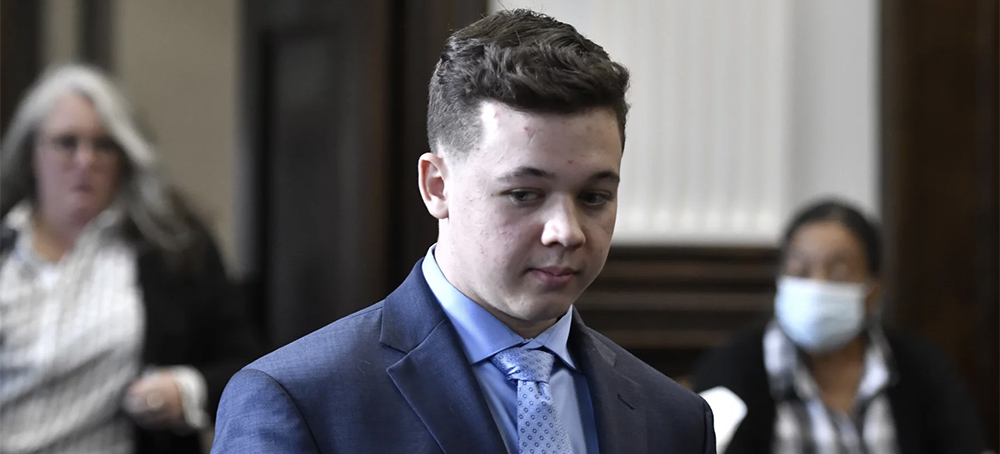 Kyle Rittenhouse pictured during a motion hearing at the Kenosha County Courthouse on Monday. (photo: Sean Krajacic/AP)
Kyle Rittenhouse pictured during a motion hearing at the Kenosha County Courthouse on Monday. (photo: Sean Krajacic/AP)
In a proceeding about the ground rules for the upcoming trial, prosecutors and defense lawyers debated whether certain language, witnesses or evidence would be allowed. The trial begins next week.
"The word 'victim' is a loaded, loaded word. And I think 'alleged victim' is a cousin to it," Judge Bruce Schroeder said on Monday, asking prosecutors to instead use the terms "complaining witness" or "decedent" to refer to those shot by Rittenhouse. (Though not universal, it is not unheard of for judges to feel that the word "victim" presupposes the defendant's guilt.)
Meanwhile, the defense will be allowed to refer to the three people Rittenhouse shot as "arsonists," "looters" or "rioters" so long as they took part in those activities, Schroeder ruled — a decision prosecutor Thomas Binger called "a double standard."
"Let the evidence show what the evidence shows," Schroeder said. "And if the evidence shows that any or more than one of these people were engaged in arson, rioting, or looting — then I'm not going to tell the defense they can't call them that."
Jury selection begins Monday in the trial. Rittenhouse faces multiple felony charges of homicide and recklessly endangering the safety of others, along with one misdemeanor count of possession of a dangerous weapon by a minor.
He has pleaded not guilty to all charges. His lawyers have argued that the shootings were in self-defense.
His case began during a tumultuous week in Kenosha, Wis., after police there shot and injured a Black man named Jacob Blake as he was attempting to enter his car. Blake survived but was paralyzed from the waist down.
The Blake shooting, which took place less than three months after the death of George Floyd, ignited protests around Kenosha that turned destructive. Over several nights, protesters destroyed police cars, damaged storefronts and burned down a used-car dealership, a furniture store and a state parole office.
On Aug. 25, the third night of protests, Rittenhouse, then 17, made the short trip from his home in Illinois across the state line, armed with an AR-15-style rifle, in response to a call from a Kenosha-based militia group saying it hoped to protect businesses from protesters.
That night, in a set of chaotic confrontations with protesters, Rittenhouse shot several people, killing two, Joseph Rosenbaum and Anthony Huber, and wounding a third, Gaige Grosskreutz.
Monday's two-hour-long hearing effectively provided a preview of the arguments each side will make in the trial and what evidence will be crucial.
Rittenhouse was being "chased," "attacked by the mob," "kicked in the face" and beaten with a skateboard, defense attorney Corey Chirafisi said.
Chirafisi argued the teenager acted in self-defense when he did fire his weapon, while showing restraint and "firearm discipline" in deciding at other times not to shoot.
Prosecutors, for their part, focused on shrinking the jurors' view of the night to a narrow view of Rittenhouse's actions and whether they were reasonable.
Binger asked the judge to disallow a video that was shared widely on social media showing police encountering Rittenhouse roughly 15 minutes before the shootings, tossing him a bottle of water and saying, "We appreciate you guys."
But Chirafisi convinced the judge that the video is relevant to understanding Rittenhouse's state of mind, which is relevant to several of the charges he faces.
First-degree reckless endangerment of safety, for instance, requires prosecutors to demonstrate that Rittenhouse acted with "utter disregard for human life."
"If ... police tell him, 'It's a good thing you people are here,' given the state of lawlessness that's existing, is that something that's influencing the defendant and emboldening him in his behavior?" the judge said. "[That] would seem to me to be an argument for relevance."
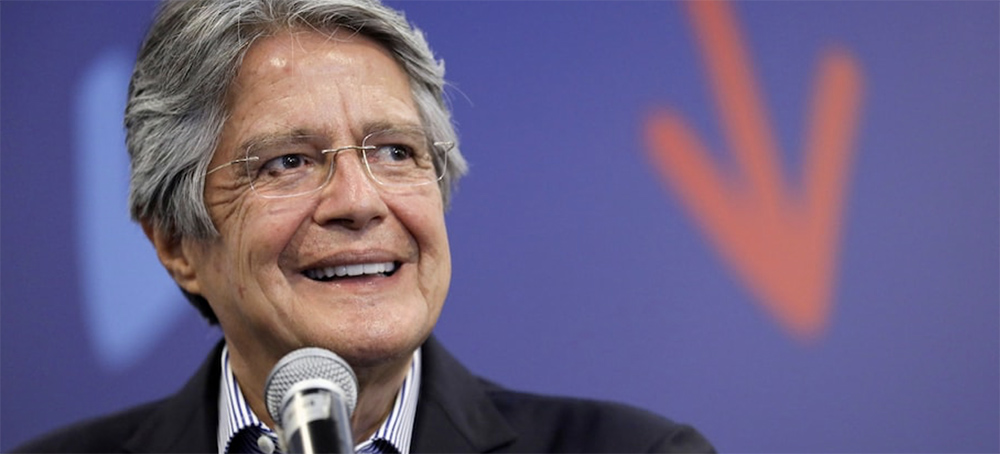 President Guillermo Lasso of Ecuador. (photo: Luisa Gonzalez/Reuters)
President Guillermo Lasso of Ecuador. (photo: Luisa Gonzalez/Reuters)
The protests today, Tuesday October 26, are expected to be the largest since Guillermo Lasso took office in May.
In Imbabura, in the canton of Peguche, repression was reported by what is believed to be members of the security forces, who threw tear gas to disperse the citizens who gathered in this sector.
The incident was recorded in videos circulating on social media, and the Alliance of Organizations for Human Rights denounced the Armed Forces' actions.
Similarly, social and indigenous organizations, workers' unions and labor unions of Ecuador began in the early hours of Tuesday a new round of protests against the economic policies of President Guillermo Lasso.
The demonstrations, called by the United Workers Front (FUT), the Popular Front (FP) and the Confederation of Indigenous Nationalities (CONAIE), were joined by organizations such as the Federation of University Students of Ecuador and the National Confederation of Peasant, Black and Indigenous Organizations, among others.
According to the convening organizations, the day of protests demands fair economic and social policies for both workers and lower-income sectors, as well as the freezing of fuel prices and the support to the draft Labor Code recently presented to the Legislative by the FUT and the rejection of the proposed Law for the Creation of Opportunities.
Given the rejection of the increase in fuel cost last Friday, Lasso froze the new prices and suspended the monthly increases; however, he could not reduce the popular discontent.
The protests occurred under a 60-day state of emergency decreed a week ago to support the police fighting against crime.
Meanwhile, the spokesman of the Presidency, Carlos Jijón, announced Tuesday afternoon that 18 people had been arrested so far for disrupting communications by closing roads, indicating that the Government will respect protests but will also prioritize people who want to work.
"The citizens were detained in flagrant offense. The Government has proceeded to capture the people at that moment, but the judges will decide the guilt of those people," said the governmental official.
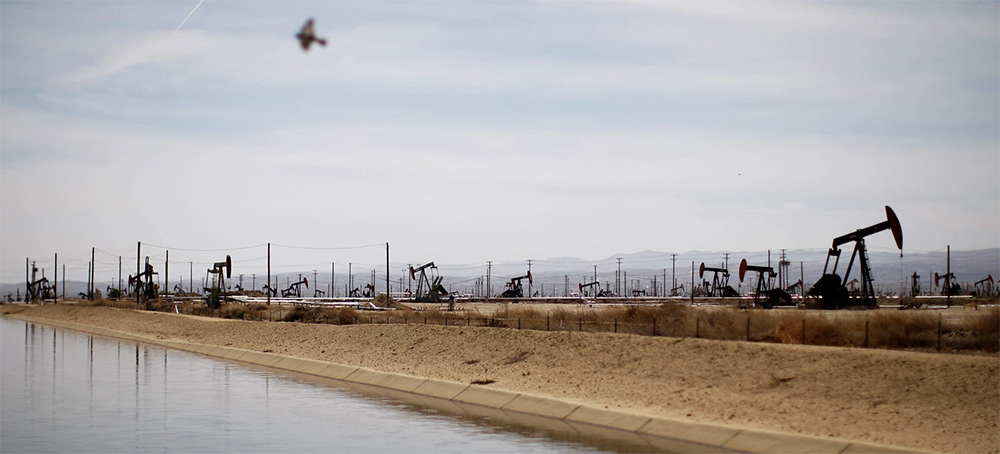 Pump jacks in California. (photo: David McNew/Getty Images)
Pump jacks in California. (photo: David McNew/Getty Images)
The research leaves little doubt: California is facing massive groundwater contamination.
Between the late 1950s and 2008, Chevron disposed much of the slurry produced in Lost Hills in eight cavernous impoundments at its Section 29 facility. Euphemistically called “ponds,” the impoundments have a combined surface area of 26 acres and do not have synthetic liners to prevent leaking. That meant that over time, salts and chemicals in the wastewater could leak into the ground and nearby water sources like the California Aqueduct, a network of canals that delivers water to farms in the Central Valley and cities like Los Angeles.
And that’s exactly what happened, according to new research published in the academic journal Environmental Science … Technology this month. Carcinogenic chemicals like benzene and toluene as well as other hydrocarbons have been detected within a half a kilometer of the facility. About 1.7 kilometers northwest of the facility, chloride and salt levels are more than six times and four times greater than background levels, respectively. The research leaves little doubt: The contaminants are migrating toward the aqueduct.
“Clearly, there’s impact to groundwater resources there,” said Dominic DiGiulio, lead author of the paper and a researcher at the nonprofit Physicians, Scientists, and Engineers for Healthy Energy. “At the section 29 facility, you have to go 1.8 kilometers away from the facility to find background water quality. That’s pretty far.”
The facility shuttered in 2008, and it no longer accepts wastewater. Chevron has continued to monitor the contaminant plume and submits yearly water quality reports to the Central Valley Regional Water Quality Control Board, a local groundwater quality regulator. In a 2019 report, the company claimed it would cost more $800,000 to monitor the plume and report to the regulator for the next 30 years.
Jonathan Harshman, a spokesperson for Chevron, said the company was reviewing the study and that it “has complied and will continue to comply with” the Central Valley Water Board’s requirements for maintaining and monitoring leaks at the Section 29 facility.
The Section 29 facility isn’t an isolated case. Between 1977 and 2017, over 16 billion barrels of oilfield wastewater was disposed in unlined ponds in California. The vast majority of these are located outside of Bakersfield in the state’s Central Valley: According to DiGiulio’s research, there are at least 1,850 wastewater ponds in the San Joaquin Valley’s Tulare Basin. Of those, 85 percent are unlined and about one-fourth are active, like the Section 29 facility. However, despite not being operational, many of them may be leaking into the ground. Wells that monitor groundwater quality are few and far between, so it’s difficult to know the exact scope of the pollution. But DiGiulio warns that the ponds constitute “a potential wide-scale legacy groundwater contamination issue.”
This month’s study is the first to quantify the number of unlined pits in California and analyze their effects on groundwater. The findings bolster 2015 research by California Council on Science … Technology and the Lawrence Berkeley National Laboratory, which concluded that unlined wastewater pits posed a threat to groundwater sources and called for investigations into whether contaminants have leaked from disposal ponds. Research conducted by the United States Geological Survey for the Central Valley Water Board has also found evidence of oil and gas wastewater contaminating groundwater.
Disposal of oil and gas wastewater is a national problem. Companies use anywhere between 1.5 million and 16 million gallons of water to frack a single well, and they have struggled to find economical and environmentally safe ways to dispose of the toxic fluid. The vast majority of the wastewater — both in California and nationally — is injected underground into porous rock formations, but companies also recycle and reuse the water to grow crops, de-ice roads, and suppress dust. California appears to be the only state that permits operators to store the waste in unlined pits, according to DiGiulio.
Patrick Pulupa, an executive officer with the Central Valley water board, defended the practice and noted that the wastewater ponds are only allowed in areas where the groundwater has been deemed too salty for irrigation or household use. In cases where the contamination has threatened usable water, he said, the Board has cracked down with cease-and-desist and investigative orders. “Board staff continue to look in detail at whether additional produced water discharges are a threat to usable groundwater and will continue to issue enforcement orders where appropriate,” he added.
The definition of groundwater that is “too salty” for use varies across California. Federal regulations consider water with less than 10,000 milligrams of dissolved solids per liter of water as protected for potential irrigation, industrial, and household use. As a result, companies are typically not allowed to dispose of wastewater in underground formations if it threatens groundwater that is below the 10,000 mg/L threshold — unless they secure an exemption from the state.
For unlined wastewater pits, however, that threshold has been set at 3,000 mg/L. The inconsistency allows oil and gas companies to pollute potential sources of groundwater, according to DiGiulio, and “appears to be the major driver for this continued disposal practice.”
“The fundamental problem is that the condition under which California groundwater is to be protected is not sufficiently stringent,” he said, adding that the state water board has the authority to increase the threshold to better protect groundwater near wastewater pits and should do so.
From Pulupa’s perspective, the 3,000 mg/L threshold is not dissimilar to the standard for disposal into underground formations in practice. Though federal regulations set the limit at 10,000 mg/L, companies are routinely granted exemptions if they can demonstrate that the groundwater is not expected to be used as a source of drinking water. The exemptions apply if the water has a dissolved solids concentration between 3,000 and 10,000 mg/L, and the controversial practice has allowed oil and gas companies to pump wastewater into hundreds of aquifers across the country. As a result, the “protective standards are relatively similar,” and the Central Valley Water Board is “unaware of any effort” to modify the definition of protected groundwater near wastewater pits, he said.
Follow us on facebook and twitter!
PO Box 2043 / Citrus Heights, CA 95611

